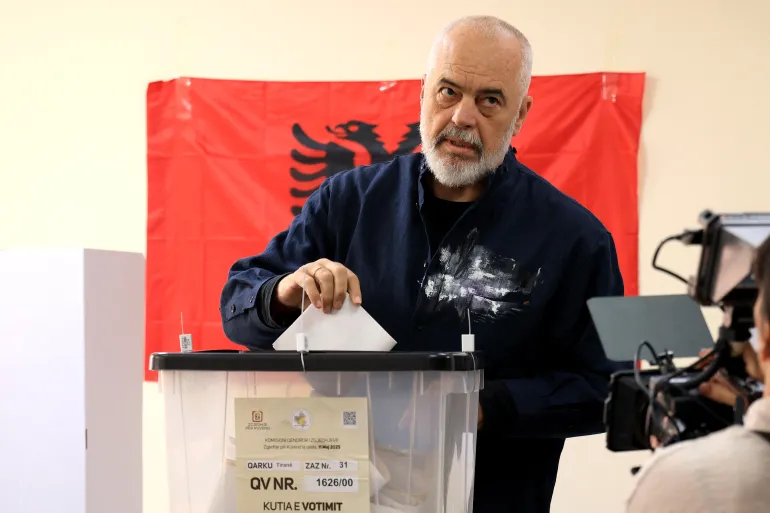By Ines Stasa (University of Tirana)
More than three decades since the fall of communism, Albanians continue to believe in the European dream. That vision remains alive, as shown by the re-election of Prime Minister Edi Rama to a fourth term in office since he first assumed power in 2013. In the most recent general elections, held on May 11, the Socialist Party secured a renewed and legitimate governing mandate. The results reflected widespread public disillusionment with the Democratic Party’s political project, while offering limited space for newer parties to emerge within the country’s political dynamics.
A landmark feature of this election was the participation of the Albanian diaspora, voting for the first time in pluralist elections since the collapse of the communist regime. Of the diaspora vote, 61.15% supported the ruling Socialist Party, 23.54% backed the Democratic Party coalition, 7.4% voted for the emerging coalition “Nisma-Shqipëria Bëhet,” 2.96% supported the “Partia Mundësia,” and 2.17% cast ballots for the “Levizja Bashkë,” with smaller opposition parties receiving minor shares. Out of 245,935 registered diaspora voters, 202,309 cast ballots, and 199,908 votes were declared valid.
Recent amendments to Albania’s Electoral Code—negotiated between the two dominant parties, the Socialist Party and the Democratic Party—mandated that one-third of each party’s candidate list be placed in safe electoral zones, while the remaining two-thirds compete openly for the rest of the parliamentary seats. This structure has reinforced the power of party leaders in securing parliamentary mandates for favored individuals, while simultaneously deepening internal polarization within political parties.
Despite this shared control over the electoral system, the two major parties approached candidate selection differently. The Democratic Party prioritized loyalists in its safe zones, including figures who returned to politics after resigning following the party’s 2013 electoral defeat. However, these candidates failed to offer the strength or renewal expected from a party in opposition for over a decade. As a result, the Democratic Party will continue to be represented by many of its veteran politicians.
Conversely, the Socialist Party demonstrated greater boldness and openness to new faces. In most districts, its closed lists included lesser-known candidates with minimal prior political involvement. Many well-established left-wing figures failed to secure a mandate, leading to a refreshed Socialist parliamentary group and the emergence of a new political class in the upcoming session. Whether Prime Minister Rama’s decision to back such unfamiliar names will foster greater political discipline or signal a genuine effort to reform the country’s largest ruling party remains to be seen. His campaign was notably steeped in pro-European rhetoric, potentially masking deeper strategic aims.
New political parties managed to secure only four parliamentary mandates in total. Two main factors contributed to their limited success: the structure of the Electoral Code, which disproportionately favors larger parties in translating votes into mandates, and the new parties’ lack of cohesion and absence of a unified opposition front. Without strategic alliances, their dissent against leftist governance and Prime Minister Rama’s leadership failed to reach full political expression.
Nevertheless, these elections offer several important lessons.
First, political parties failed to effectively mobilize and represent the diaspora vote, transforming what should have been a democratic milestone into allegations of electoral manipulation and procedural unfairness. The diaspora is now a powerful new player in Albanian politics. Parties must better understand this constituency and refine their strategies for meaningful engagement. This is the first time the diaspora has participated directly in shaping Albania’s domestic political future, yet most major party candidates lacked concrete proposals for how to harness the diaspora’s financial and human capital to improve life at home. One notable exception was Klevis Kaso, a Socialist Party candidate in Vlora, who proposed establishing a local diaspora fund aimed at stimulating economic and technological development in southern Albania.
Going forward, Albania’s political actors must demonstrate the political will to build lasting networks with Albanian communities abroad, ensuring that their vote is not only legitimate but also impactful in shaping the country’s future.
Second, new political parties must form stronger partnerships and open their doors to unrepresented voices in society. They must craft a compelling national narrative, grounded in programs, legislative initiatives, and alternative visions. More importantly, they must reconnect everyday citizens with politics as a tool for representation and agency.
Third, the Democratic Party must seriously consider opening its political space, cultivating new leadership, and creating concrete opportunities for a new political generation. It is time to conclude its long and weary transition that has exhausted its base and the broader Albanian public.
While the Democratic Party continues to dispute the 2025 election results, Prime Minister Rama’s participation in the European Political Community Summit was met with congratulatory remarks from European leaders, reaffirming his government’s legitimacy. Albanians voted peacefully and selected their preferred parties and candidates. Yet, as has often been the case over the past 34 years of post-communist democracy, despite consensus between major parties on preserving the status quo, allegations of fraud, contestation of results, and divisive political rhetoric continue to mar the process.
What happens next remains to be seen.
Photo source: https://www.aljazeera.com/news/2025/5/13/albania-election-results-2025


